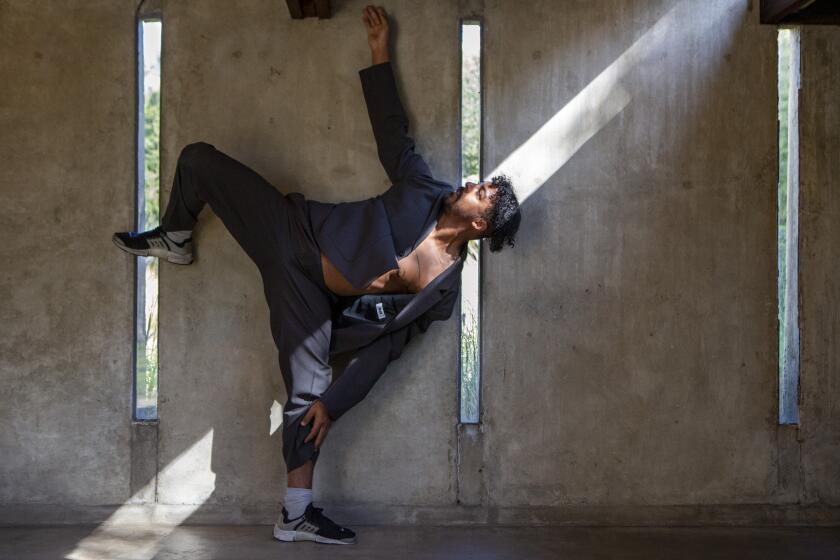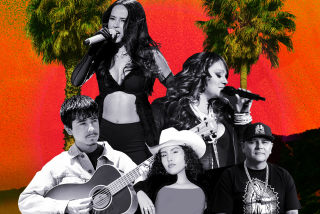A Latina void in podcasting? The women of ‘Locatora Radio’ are all over that
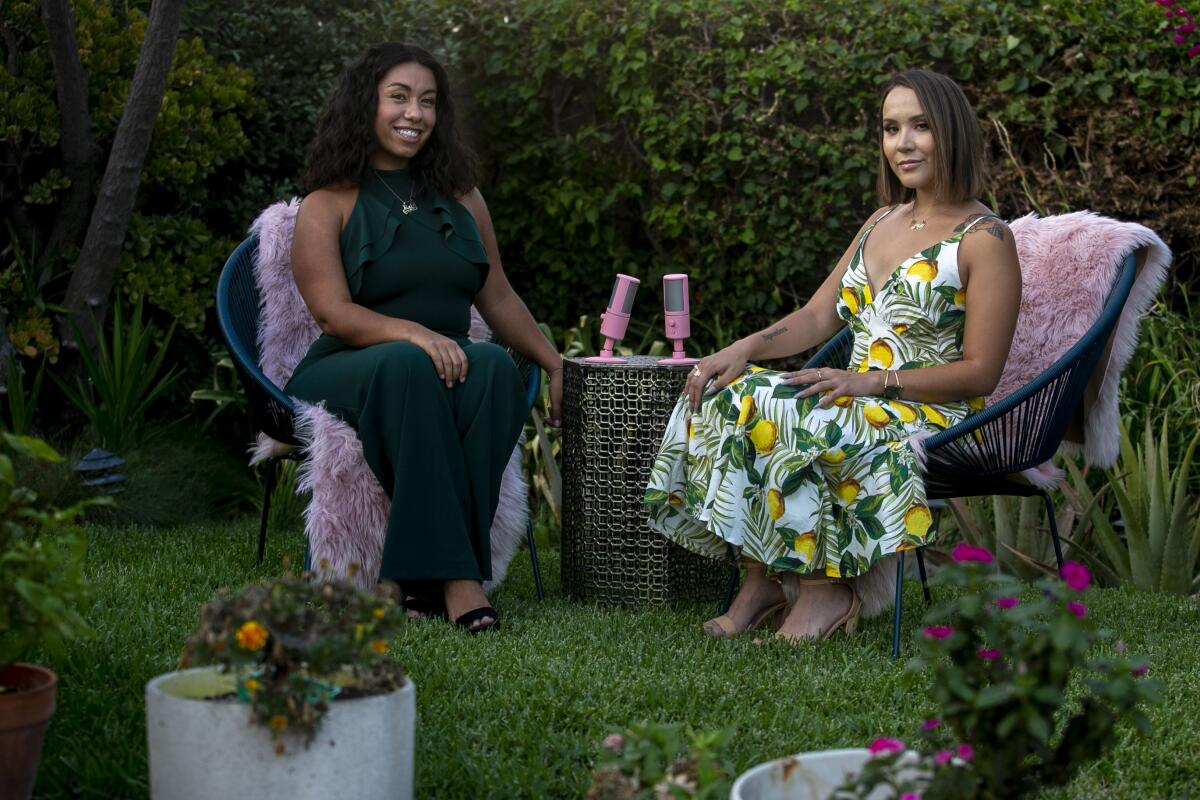
- Share via
Zoe “Mala” Muñoz was exchanging casual messages with a man on the Hinge dating app when he suddenly popped the question: “So do you like anal?”
“It just came out of nowhere,” Mala told viewers in a recent Instagram Live session where she and Ariana “Diosa” Rodriguez, her cohost for the podcast “Locatora Radio: A Radiophonic Novela,” answered questions from fans. A viewer wanted to know what Mala and Diosa thought about anti-dating culture, which prompted a discussion about the bold environment many women navigate on dating apps.
“I can’t imagine a conversation being like, ‘What did you have for lunch? Do you like anal?’ in the same breath,” Diosa said while laughing at the man’s small talk with Mala.
Sex is a popular theme on their DIY indie podcast, but Mala, who graduated from Tufts University, and Diosa, an alum of UC Santa Barbara, inform their shows with an elevated discourse while making subjects accessible for their predominantly Latinx listeners. The show highlights the talents of women of color while covering topics including sex education and wellness, culture, arts, politics and intersectional feminism.
“We had to be very intentional about the space that we were creating as podcasters,” Diosa said.
Their socially conscious programming has resulted in a devoted following, especially in Los Angeles, where Mala and Diosa are based. One of their biggest supporters, renowned Salvadoran poet and writer Yesika Salgado, attributed the podcast’s success to the hosts’ ability to connect authentically with their audiences.
“Everyone comes to art — yes, podcasts are art — looking for themselves, and ‘Locatora Radio’ holds up a mirror to their listeners,” Salgado said.
Salgado is such a fan of “Locatora Radio” that she always grants her first interview to them every time she launches a new book.
“‘Locatora’ has been my go-to podcast for each of my book releases because I want my readers to experience my work through a natural lens, through our friendship. … I know that when I sit with the Locatoras to talk about my poetry, they already understand me, I don’t have to translate or code switch my heart,” Salgado said.
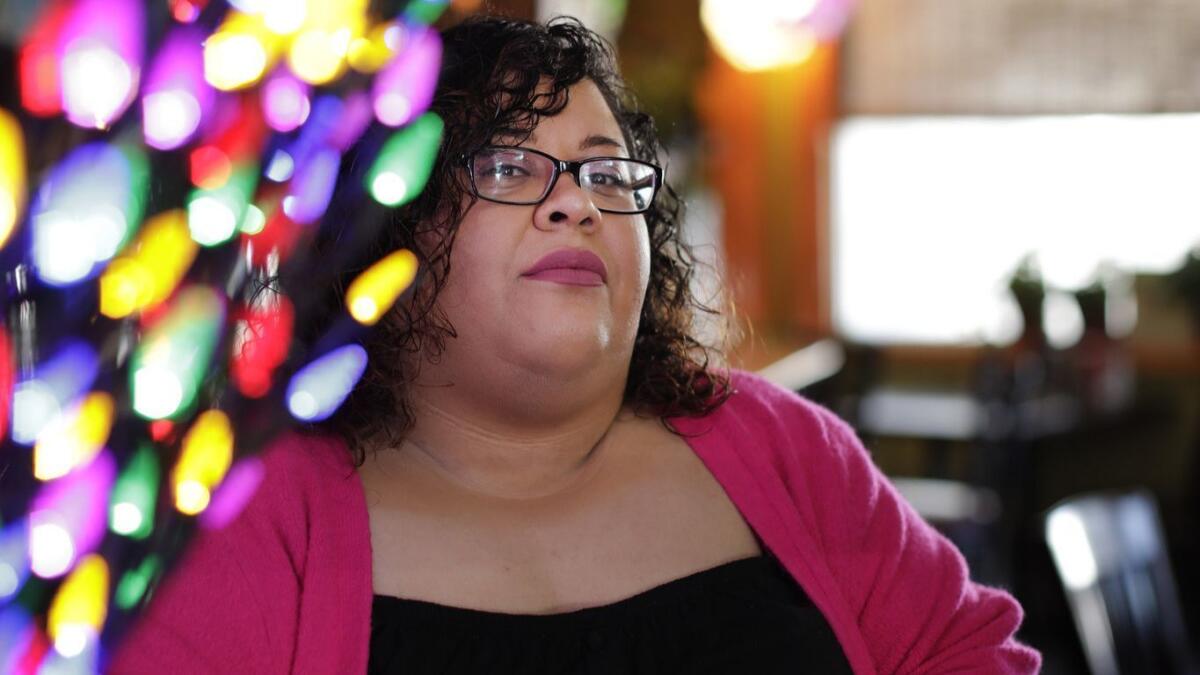
Elsewhere, appreciation for “Locatora Radio” has manifested on college campuses — UCLA, USC, Stanford, Williams, Northwestern — where the podcasters are often flown to deliver keynotes, speak on panels or record episodes in front of live audiences. The turnout tends to be overwhelming. Their visit to Cardinal Stritch University stands out as a fond memory. The podcasters said they didn’t know what to expect from the Christian liberal arts school in Wisconsin because their analytics showed the majority of listeners are based in L.A. and New York.
“People told us that they drove in from an hour away, from two hours away,” Mala said. “We had a full house in Milwaukee full of people of color and predominantly Latinx people.”
Data on the demographics of podcast hosts are still scarce for the nascent medium, but a recent Edison Research study shows that 25% of Latinx people in the United States are monthly podcast listeners. According to Edison, the study is “the first and only comprehensive research on Latino podcast listeners.” It shows that 55% of U.S. Latinx podcast listeners identify as male — a reflection, some would argue, of the need for more podcasting content that specifically caters to Latinas.
“We were very plugged into conversations happening online, which informed how conscious we were about creating a brand-new space, platform and project,” Diosa said of their Latina focus.
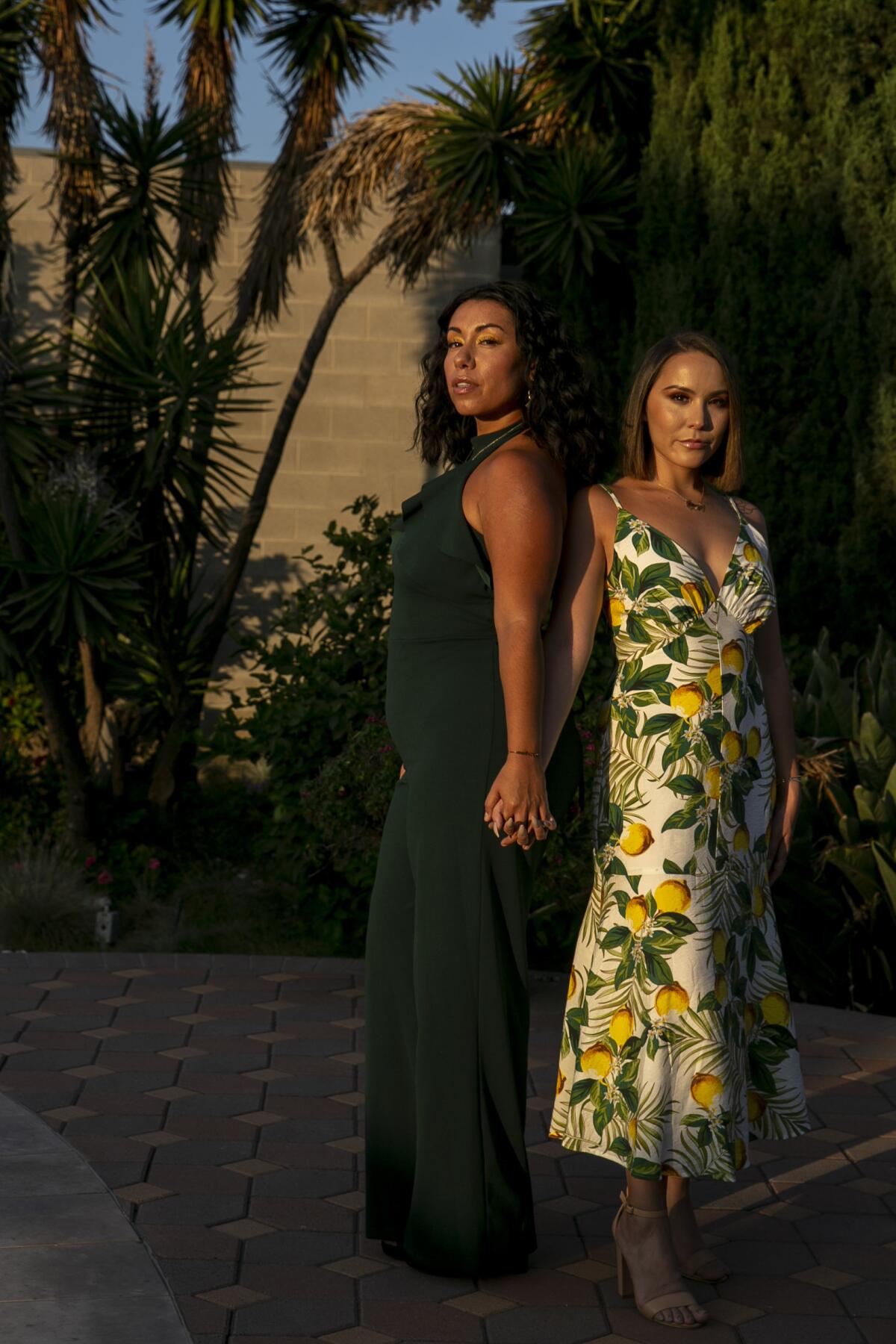
Last summer “Locatora Radio” reached 500,000 all-time listens across all streaming platforms. Diosa and Mala held podcasting workshops across 11 L.A. Public Library branches for the city’s “L.A. Made” series, a collaboration that culminated with a grand “Locatora Radio” live event at the Central Library’s Mark Taper Auditorium downtown. In 2019, the podcast was nominated for Breakout Creator of the Year at the Tecla Awards for Hispanic content creators and influencers.
The pandemic hasn’t slowed them down. Mala and Diosa hosted virtual events such as Grand Park’s Our L.A. Voices 2020: Arts+Culture Fest, all while continuing to release episodes with notable guests including Linda Yvette Chávez and Marvin Lemus, the creators of the Netflix series “Gentefied.” In May, Mala and Diosa were interviewed by Zoe Saldana on Saldana’s media platform, Bese, to talk about sexual wellness in the Latinx community.
“We’re not given sex education as Latinx folks, and specifically our demographic, Latinas,” Diosa said.
She and Mala have used their podcast to promote sex positivity and to tackle topics that are deemed taboo in Latinx culture.
“Latinas are hypersexualized [in the media], but we also tend to come from families and communities where we absolutely do not talk about sexuality and we do not have access to sex ed,” Mala said. “We are put into this predicament where we’re hypersexualized but also denied access to language and education and information about our bodies and sexualities. It’s a conundrum.”
“Locatora Radio” conversations about sexual health don’t just center on lighthearted topics. When the podcast started in 2016, Mala was an on-call rape crisis counselor. The work was difficult, and it often entailed responding to medical centers for forensic administration of rape kits and SART (Sexual Assault Response Team) exams, helping victims go into immediate shelter, and accompanying survivors to court to testify against their rapists. The work took a heavy toll on her.
“The thing that I needed to do was to scream into the void,” she said, noting how terribly the system treats women and children, “and knowing for a fact that the vast majority of rapists and abusers get away with it — never get arrested, never go to jail, never even get interviewed by police. Sometimes the biggest trouble was just getting the cops to write a report, so I needed to be able to go and vent and talk about it somewhere.”
Mala sublimated all of that energy and used her experiences to steer “Locatora Radio” into the direction of advocacy and to create an environment where taboo conversations could unfold safely with support and understanding.
“We knew that we wanted to not only talk about ourselves as Latinas but also center issues important to survivors of sexual violence and survivors of relationship violence,” Mala said. “From the beginning, our ethos — our whole thing is really about being survivor-centered through this Latinx lens that we have.”
Another takeaway from Mala’s job was realizing which communities needed the most help in L.A.
“The majority of my clients were Latinas, Black women, and children,” Mala said, noting that women of color were not only disproportionately affected but also less likely to have access to an attorney or other types of help.
Racial awareness is evident in the “Locatora Radio” catalog, and the majority of the episodes chronicle socioeconomic issues that affect Latinas. The podcast has shared its platform with Black women and Afro-Latinas to call out anti-Blackness in the Latinx community, especially people of Mexican descent.
“I think it’s important as non-Black Latinas to leverage our privilege and call in on our folks, and we have to call in on our Chicanos and Mexican folks being anti-Central American, xenophobic, anti-Black and anti-Indigenous,” Diosa said. “There’s a lot of work to be done in our own community, and if we have the audience and people are listening, we have to use that power and that platform.”
Mala is a third-generation Chicana and Diosa is Peruvian and Mexican. Exploring the beauty of their distinct identities is often skillfully blended into conversations about marginalized experiences and histories. Episode 6, which was conducted entirely in Spanish, featured Afro-Peruvian dancer Nadia Calmet. The conversation explored African roots in Peruvian culture and detailed Calmet’s experiences as a Black woman in Peru.
“Being able to weave that into the podcast was really important to me,” Diosa said, adding that it’s one of her favorite episodes.
Chris Emile’s show about Black masculinity premiered in March at the MAK Center in West Hollywood. How he’s resurrected it, with pandemic precautions.
Their latest season has continued to shed light on racial issues, especially after this year’s Black Lives Matter protests. Episode 83, recorded in the aftermath of George Floyd’s death by Minneapolis police, features testimony from Nadia Nibbs, a Black educator based in that city, who talked about the turbulence she was witnessing. In Episode 84, Diosa called for Black and brown unity during the protests, and Mala talked about the L.A. marches against police brutality that she attended.
The episode also included a conversation with Katelina “Gata” Eccleston, the Afro-Latina host of the show “Reggaeton Con la Gata,” who examined anti-Blackness in reggaetón and the genre’s connection to current conversations about race and identity. Diosa said she had been a fan of Eccleston’s work and that Eccleston had been a slated guest long before the protests.
“With our lifelong journey, you’re in the struggle forever, it’s not just this hot moment coming into consciousness and learning about the Black Lives Matter movement,” Diosa said. “That is why it was important for us with the inception of ‘Locatora Radio’ that we were including Black women in the conversation and never speaking for them or their experience.”
At the end of the day, balance is key — so even when conversations turn uncomfortable or onerous, Mala and Diosa find a way to uplift their audience. They conclude episodes with the mantra that catapulted their success in the first place: “archiving and celebrating the brilliance of women of color.”
“Prioritizing fun things, joy and art, that’s just as important,” Diosa said. “Even when we have very difficult conversations, we never want our listeners to walk away feeling drained, feeling exhausted, feeling like they were in a lecture. We want them to feel empowered.”
Amy Sherald, who painted Michelle Obama for the National Portrait Gallery, conjures the slain young woman in a remarkable piece of art.
More to Read
The biggest entertainment stories
Get our big stories about Hollywood, film, television, music, arts, culture and more right in your inbox as soon as they publish.
You may occasionally receive promotional content from the Los Angeles Times.
